Analysis of EU Law: Parliament's Role, Legislation, and Democracy
VerifiedAdded on 2022/12/28
|5
|972
|90
Essay
AI Summary
This essay provides an overview of European Union Law, focusing on the role of the EU Parliament and the enactment of primary legislation. It outlines the three main roles of the EU Parliament: passing laws, making amendments, and supervising EU institutions and budget. The essay then discusses the sources of EU law, including primary, secondary, and supplementary law. It explores the expectations placed on the EU and the democratic legitimacy of the EU institutions. The essay also examines the argument that the EU is insufficiently democratic, highlighting a perceived lack of accessibility, accountability, and representation. It concludes by comparing the EU to other forms of government and analyzing its complex institutional structure, emphasizing the importance of citizen representation and the election of EU Parliament members.
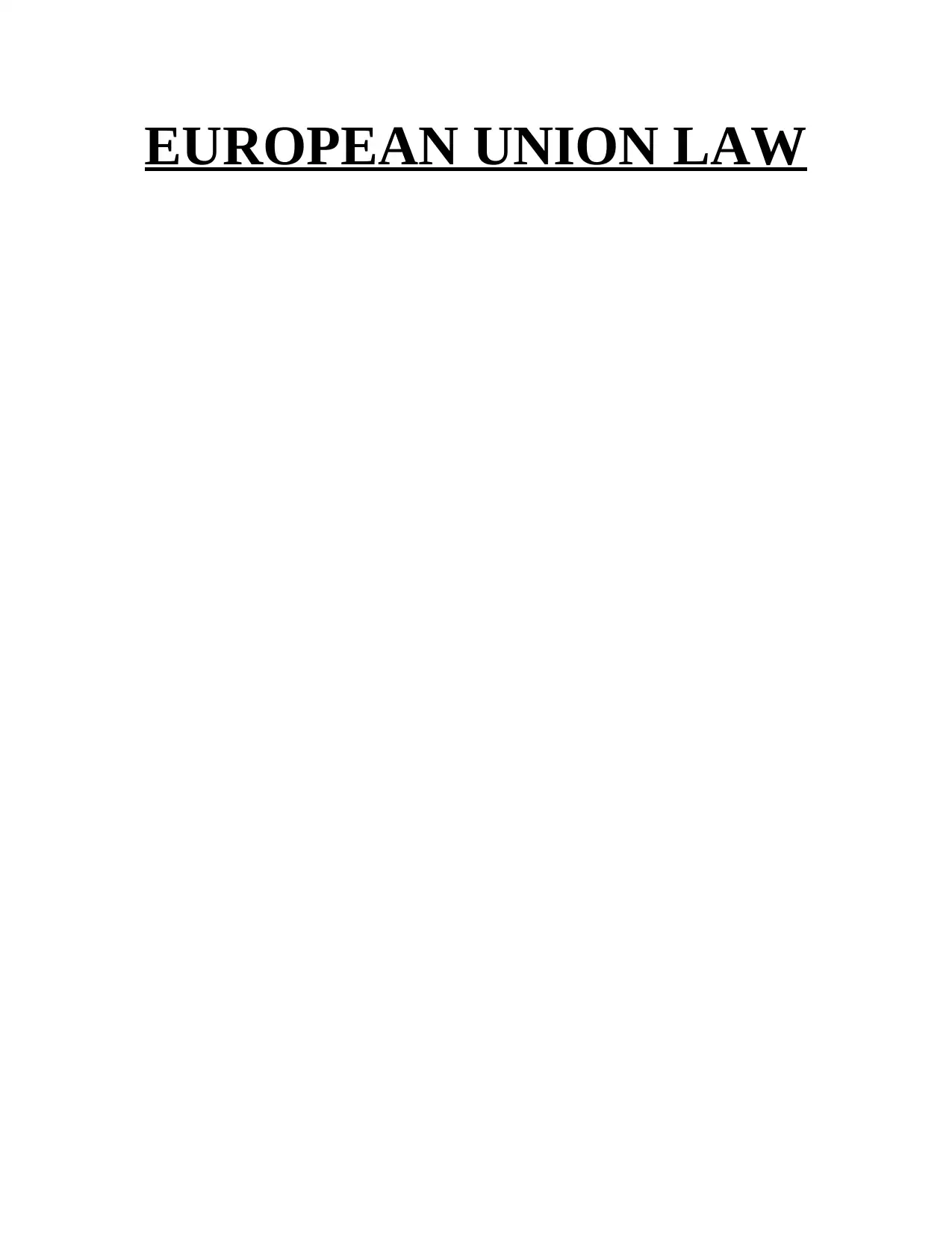
EUROPEAN UNION LAW
Paraphrase This Document
Need a fresh take? Get an instant paraphrase of this document with our AI Paraphraser
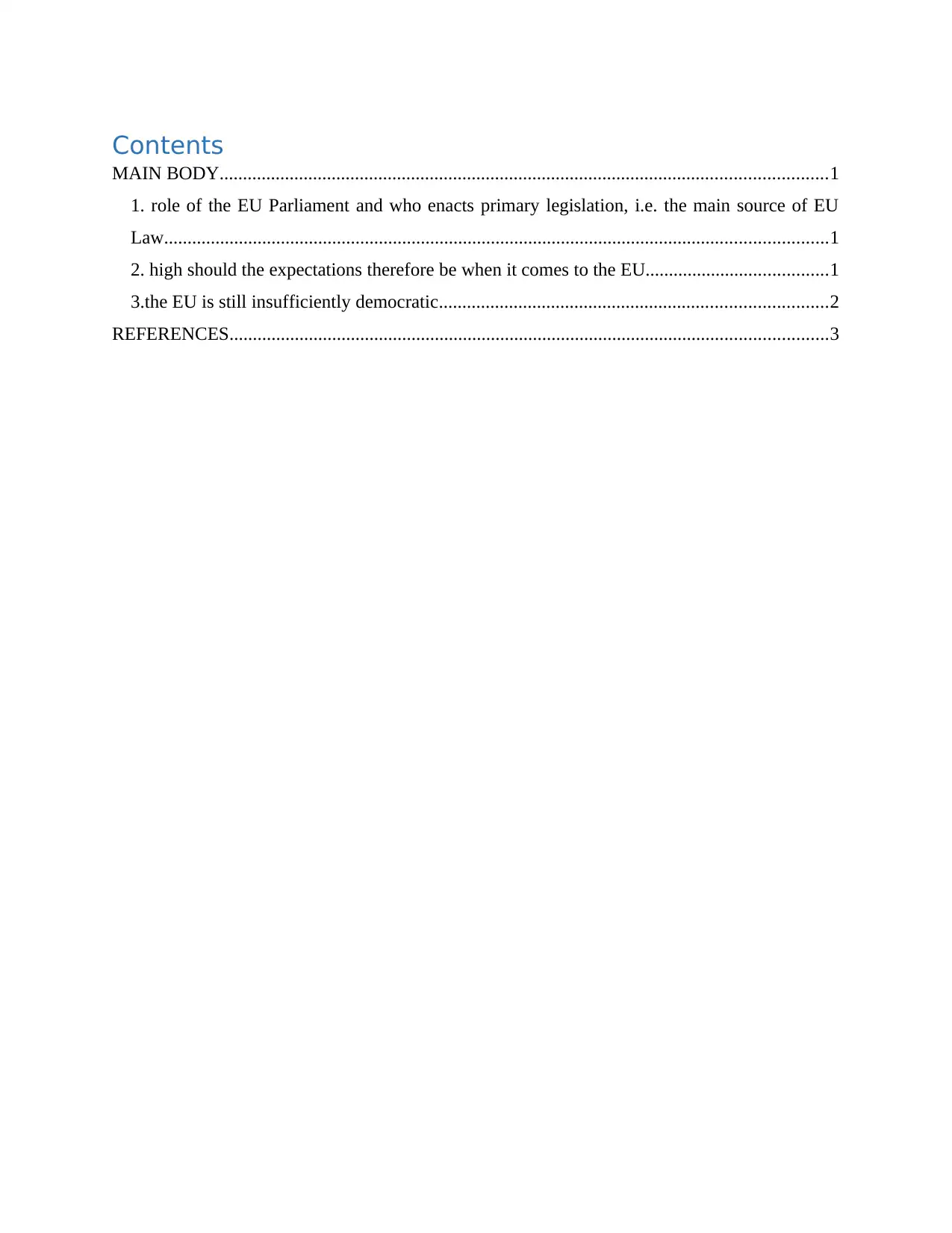
Contents
MAIN BODY..................................................................................................................................1
1. role of the EU Parliament and who enacts primary legislation, i.e. the main source of EU
Law..............................................................................................................................................1
2. high should the expectations therefore be when it comes to the EU.......................................1
3.the EU is still insufficiently democratic...................................................................................2
REFERENCES................................................................................................................................3
MAIN BODY..................................................................................................................................1
1. role of the EU Parliament and who enacts primary legislation, i.e. the main source of EU
Law..............................................................................................................................................1
2. high should the expectations therefore be when it comes to the EU.......................................1
3.the EU is still insufficiently democratic...................................................................................2
REFERENCES................................................................................................................................3
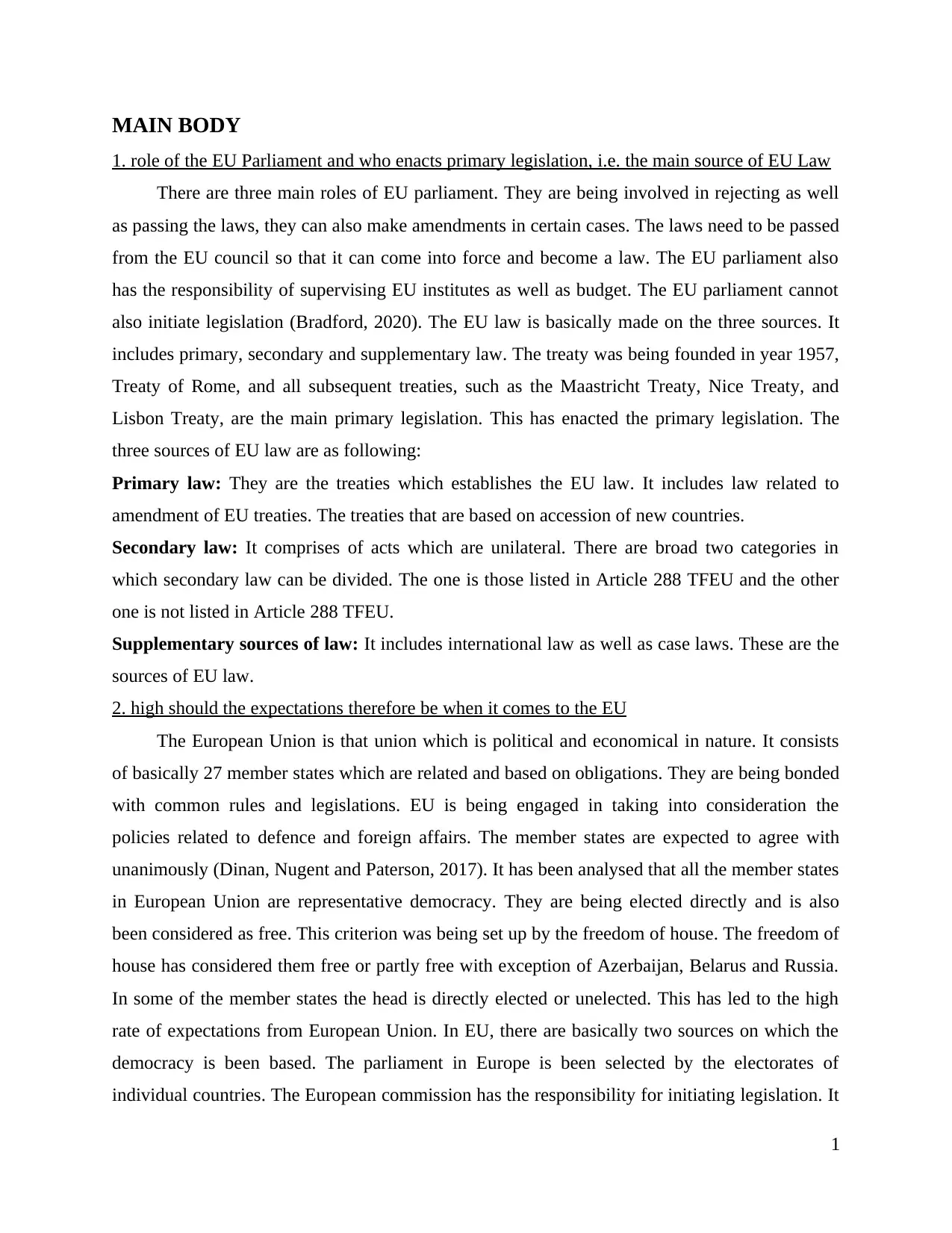
MAIN BODY
1. role of the EU Parliament and who enacts primary legislation, i.e. the main source of EU Law
There are three main roles of EU parliament. They are being involved in rejecting as well
as passing the laws, they can also make amendments in certain cases. The laws need to be passed
from the EU council so that it can come into force and become a law. The EU parliament also
has the responsibility of supervising EU institutes as well as budget. The EU parliament cannot
also initiate legislation (Bradford, 2020). The EU law is basically made on the three sources. It
includes primary, secondary and supplementary law. The treaty was being founded in year 1957,
Treaty of Rome, and all subsequent treaties, such as the Maastricht Treaty, Nice Treaty, and
Lisbon Treaty, are the main primary legislation. This has enacted the primary legislation. The
three sources of EU law are as following:
Primary law: They are the treaties which establishes the EU law. It includes law related to
amendment of EU treaties. The treaties that are based on accession of new countries.
Secondary law: It comprises of acts which are unilateral. There are broad two categories in
which secondary law can be divided. The one is those listed in Article 288 TFEU and the other
one is not listed in Article 288 TFEU.
Supplementary sources of law: It includes international law as well as case laws. These are the
sources of EU law.
2. high should the expectations therefore be when it comes to the EU
The European Union is that union which is political and economical in nature. It consists
of basically 27 member states which are related and based on obligations. They are being bonded
with common rules and legislations. EU is being engaged in taking into consideration the
policies related to defence and foreign affairs. The member states are expected to agree with
unanimously (Dinan, Nugent and Paterson, 2017). It has been analysed that all the member states
in European Union are representative democracy. They are being elected directly and is also
been considered as free. This criterion was being set up by the freedom of house. The freedom of
house has considered them free or partly free with exception of Azerbaijan, Belarus and Russia.
In some of the member states the head is directly elected or unelected. This has led to the high
rate of expectations from European Union. In EU, there are basically two sources on which the
democracy is been based. The parliament in Europe is been selected by the electorates of
individual countries. The European commission has the responsibility for initiating legislation. It
1
1. role of the EU Parliament and who enacts primary legislation, i.e. the main source of EU Law
There are three main roles of EU parliament. They are being involved in rejecting as well
as passing the laws, they can also make amendments in certain cases. The laws need to be passed
from the EU council so that it can come into force and become a law. The EU parliament also
has the responsibility of supervising EU institutes as well as budget. The EU parliament cannot
also initiate legislation (Bradford, 2020). The EU law is basically made on the three sources. It
includes primary, secondary and supplementary law. The treaty was being founded in year 1957,
Treaty of Rome, and all subsequent treaties, such as the Maastricht Treaty, Nice Treaty, and
Lisbon Treaty, are the main primary legislation. This has enacted the primary legislation. The
three sources of EU law are as following:
Primary law: They are the treaties which establishes the EU law. It includes law related to
amendment of EU treaties. The treaties that are based on accession of new countries.
Secondary law: It comprises of acts which are unilateral. There are broad two categories in
which secondary law can be divided. The one is those listed in Article 288 TFEU and the other
one is not listed in Article 288 TFEU.
Supplementary sources of law: It includes international law as well as case laws. These are the
sources of EU law.
2. high should the expectations therefore be when it comes to the EU
The European Union is that union which is political and economical in nature. It consists
of basically 27 member states which are related and based on obligations. They are being bonded
with common rules and legislations. EU is being engaged in taking into consideration the
policies related to defence and foreign affairs. The member states are expected to agree with
unanimously (Dinan, Nugent and Paterson, 2017). It has been analysed that all the member states
in European Union are representative democracy. They are being elected directly and is also
been considered as free. This criterion was being set up by the freedom of house. The freedom of
house has considered them free or partly free with exception of Azerbaijan, Belarus and Russia.
In some of the member states the head is directly elected or unelected. This has led to the high
rate of expectations from European Union. In EU, there are basically two sources on which the
democracy is been based. The parliament in Europe is been selected by the electorates of
individual countries. The European commission has the responsibility for initiating legislation. It
1
⊘ This is a preview!⊘
Do you want full access?
Subscribe today to unlock all pages.

Trusted by 1+ million students worldwide
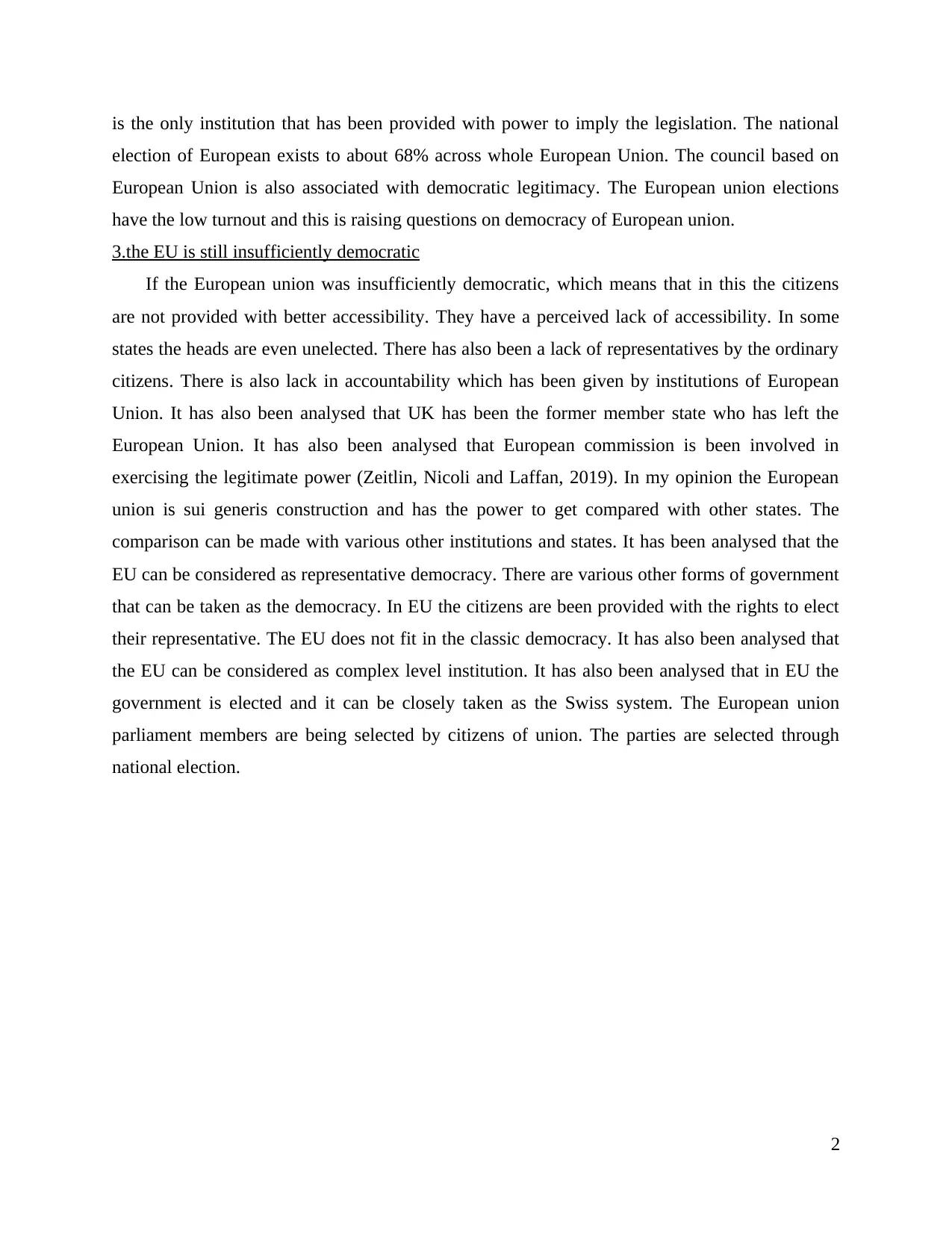
is the only institution that has been provided with power to imply the legislation. The national
election of European exists to about 68% across whole European Union. The council based on
European Union is also associated with democratic legitimacy. The European union elections
have the low turnout and this is raising questions on democracy of European union.
3.the EU is still insufficiently democratic
If the European union was insufficiently democratic, which means that in this the citizens
are not provided with better accessibility. They have a perceived lack of accessibility. In some
states the heads are even unelected. There has also been a lack of representatives by the ordinary
citizens. There is also lack in accountability which has been given by institutions of European
Union. It has also been analysed that UK has been the former member state who has left the
European Union. It has also been analysed that European commission is been involved in
exercising the legitimate power (Zeitlin, Nicoli and Laffan, 2019). In my opinion the European
union is sui generis construction and has the power to get compared with other states. The
comparison can be made with various other institutions and states. It has been analysed that the
EU can be considered as representative democracy. There are various other forms of government
that can be taken as the democracy. In EU the citizens are been provided with the rights to elect
their representative. The EU does not fit in the classic democracy. It has also been analysed that
the EU can be considered as complex level institution. It has also been analysed that in EU the
government is elected and it can be closely taken as the Swiss system. The European union
parliament members are being selected by citizens of union. The parties are selected through
national election.
2
election of European exists to about 68% across whole European Union. The council based on
European Union is also associated with democratic legitimacy. The European union elections
have the low turnout and this is raising questions on democracy of European union.
3.the EU is still insufficiently democratic
If the European union was insufficiently democratic, which means that in this the citizens
are not provided with better accessibility. They have a perceived lack of accessibility. In some
states the heads are even unelected. There has also been a lack of representatives by the ordinary
citizens. There is also lack in accountability which has been given by institutions of European
Union. It has also been analysed that UK has been the former member state who has left the
European Union. It has also been analysed that European commission is been involved in
exercising the legitimate power (Zeitlin, Nicoli and Laffan, 2019). In my opinion the European
union is sui generis construction and has the power to get compared with other states. The
comparison can be made with various other institutions and states. It has been analysed that the
EU can be considered as representative democracy. There are various other forms of government
that can be taken as the democracy. In EU the citizens are been provided with the rights to elect
their representative. The EU does not fit in the classic democracy. It has also been analysed that
the EU can be considered as complex level institution. It has also been analysed that in EU the
government is elected and it can be closely taken as the Swiss system. The European union
parliament members are being selected by citizens of union. The parties are selected through
national election.
2
Paraphrase This Document
Need a fresh take? Get an instant paraphrase of this document with our AI Paraphraser
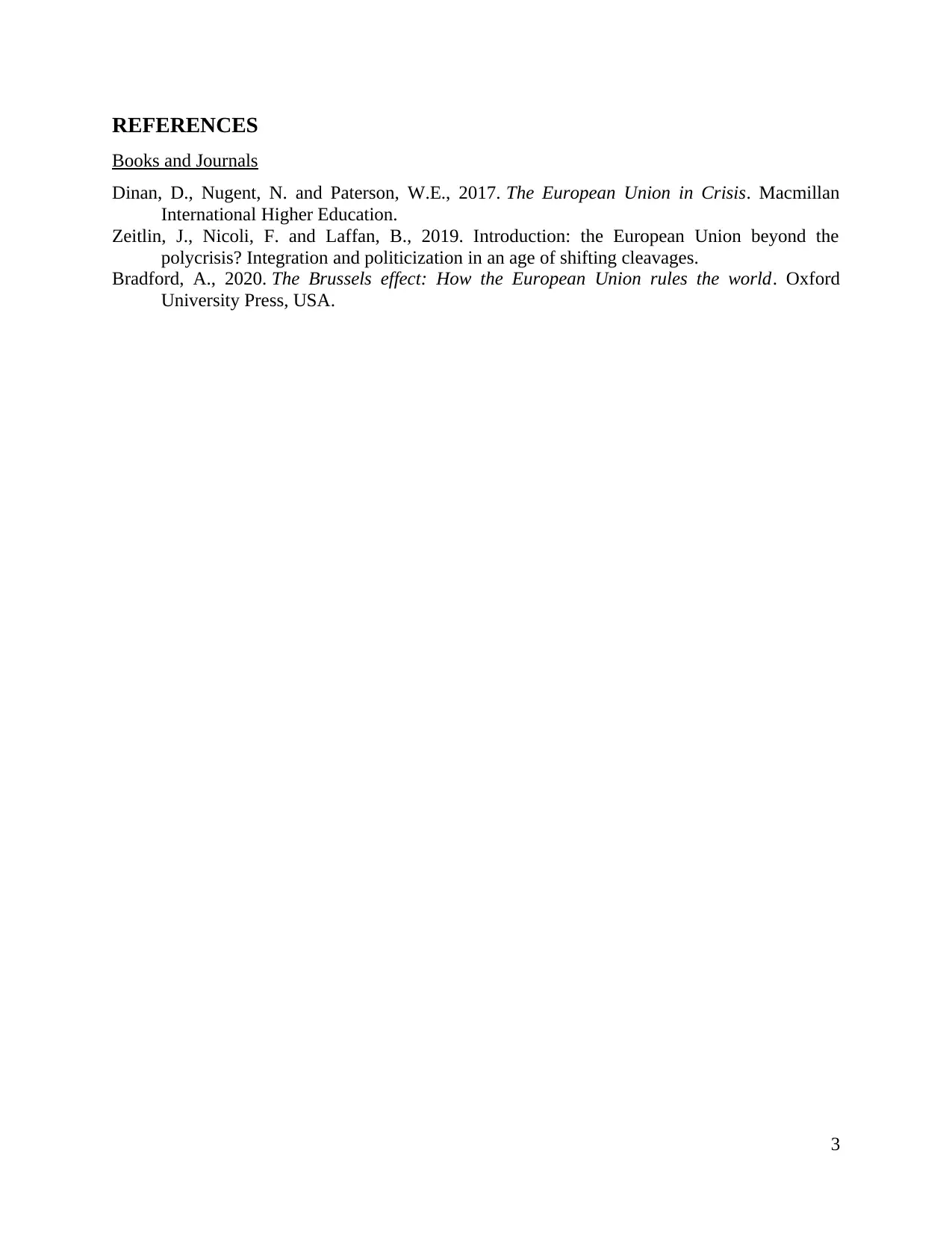
REFERENCES
Books and Journals
Dinan, D., Nugent, N. and Paterson, W.E., 2017. The European Union in Crisis. Macmillan
International Higher Education.
Zeitlin, J., Nicoli, F. and Laffan, B., 2019. Introduction: the European Union beyond the
polycrisis? Integration and politicization in an age of shifting cleavages.
Bradford, A., 2020. The Brussels effect: How the European Union rules the world. Oxford
University Press, USA.
3
Books and Journals
Dinan, D., Nugent, N. and Paterson, W.E., 2017. The European Union in Crisis. Macmillan
International Higher Education.
Zeitlin, J., Nicoli, F. and Laffan, B., 2019. Introduction: the European Union beyond the
polycrisis? Integration and politicization in an age of shifting cleavages.
Bradford, A., 2020. The Brussels effect: How the European Union rules the world. Oxford
University Press, USA.
3
1 out of 5
Related Documents
Your All-in-One AI-Powered Toolkit for Academic Success.
+13062052269
info@desklib.com
Available 24*7 on WhatsApp / Email
![[object Object]](/_next/static/media/star-bottom.7253800d.svg)
Unlock your academic potential
Copyright © 2020–2026 A2Z Services. All Rights Reserved. Developed and managed by ZUCOL.





